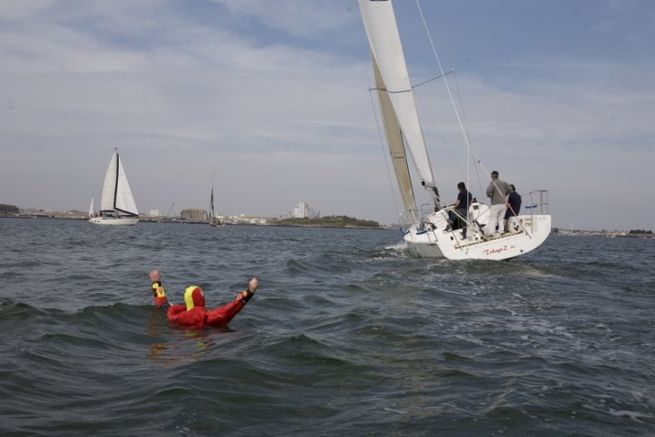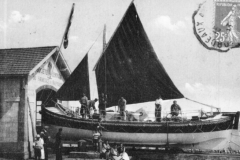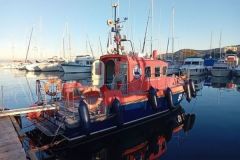A crew member falling overboard is a stressful and scattering experience. Between attempting a recovery maneuver, pressing the Ditress button on the VHF and contacting the CROSS, gathering effective information can be complicated. When faced with such intense stress, it is only by having prepared the things to do beforehand that we can be more certain of not forgetting anything.
First of all, keep in mind that the boat closest to the crew member who falls into the water is his own! You must therefore immediately do everything possible to recover it by your own means. To do this, once a crew member is in the water, a crew member must immediately fix him and keep him in his field of vision. This dedicated person must do nothing else and never let him out of sight. The rest of the crew can then focus on raising the alarm and starting a man overboard recovery maneuver.
Giving the alert
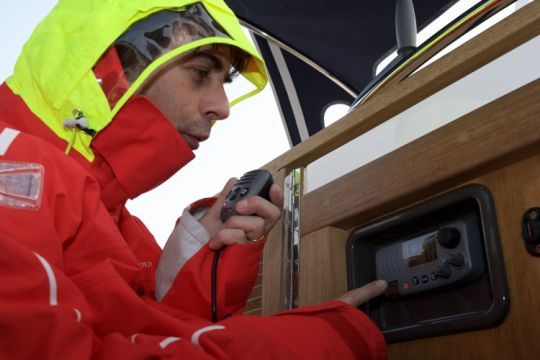
This may seem basic, but you should not waste time giving the alert. It is usually better to have a false alarm ( but cancelled of course ) given too early than a real one given too late. After pressing the " DITRESS "This is the only way to raise the alarm.
You can also initiate a MAYDAY on channel 16 with the VHF.
" Mayday Mayday Mayday
HERE <NOM DU BATEAU> <NOM DU BATEAU> <NOM DU BATEAU>
One of my crew members fell overboard.
I find myself <LOCALISATION GPS>
I am on my way to <VITESSE> to <CAP>
At the time of the fall, the person, <SEXE > was wearing clothes <COULEUR DES VETEMENTS>
I request immediate assistance.
End of mayday message "
And restart or have this call restarted every 2 minutes until an authority has acknowledged and an actual action is initiated ( the CROSS will inform you if necessary ).
If you only have a mobile phone on board, you can call 196, the number to reach the CROSS in France.
Method and efficiency
Because your memory will play tricks on you, we advise you to write down in a notebook or a notebook all the elements we recommend. But not only that. Indeed, you will have to date the events and actions in order to be sure to be able to unfold the actions and to be able to expose the way in which the events occurred if necessary.
About the person who fell in the water
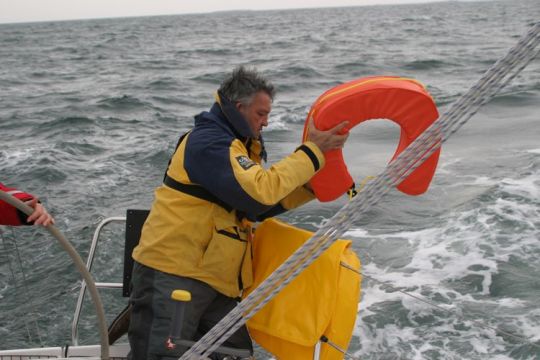
The person who has fallen into the sea may be in different conditions. Sick and in a bathing suit, the victim will be in danger more quickly than in good health and equipped with a life jacket. These are the questions that the authorities may have to ask you and we recommend that you be prepared. It is obviously not a question of taking note of all these points, as the day progresses, but of having in mind the list of points to be addressed, to memorize them unconsciously.
- Is the fallen person wearing a life jacket?
- Is the victim in good health? Does he or she have a particular disease or condition?
In the case of a long cruise, you will have previously asked each crew member to give you this information.
- Was the crew member who fell wearing shoes? Boots? Clothing? What color?
- Are the vests equipped with a MOB-AIS and/or a light device and/or a portable VHF?
Captain, you must know this information.
- Can your crew member swim?
This information must be included in the same place as the medical information.
- Has he been drinking or taking drugs?
You are responsible for what happens on your boat.
About the environment
Information about the environment at the time of the fall and the place where it occurred will be effective tools in the search for the victim of this incident. Depending on the state of the sea, the distance from the coast or the swell, the search will be carried out in one way or another.
- At the time of the fall, how strong was the wind?
- When the crew member fell, how was the sea?
- What is the temperature of the water?
- What is the outside temperature?
- What time did the crewman fall? In what time zone?
- What was the precise GPS location at the time of the fall?
- How fast was the boat going when it fell?
We recommend that you keep all these notes, both during and after the recovery of your passenger. If he could not be found of course, but if he was, to remind you of the method applied and to be able to hoard it to make it more effective in the future.
Prepare for the incident
As with many incidents, the first few seconds after it happens are crucial to its outcome. For this reason, although it is easier to write than to live, we recommend that you be as calm and distant as possible from the incident, not shouting or making grand gestures. By being physically as composed as possible, you will remain calmer and thus less likely to make mistakes.
Avoid aggravating the accident
Finally, it is by having foreseen the possibility of this type of incident occurring, by having explained the method to your crew as well, that you will be able to approach it with more serenity and calm and will thus be able to better assist the victim. Remember to divide the roles in your crew between those who alert, those who scan the horizon and those who pilot the boat.
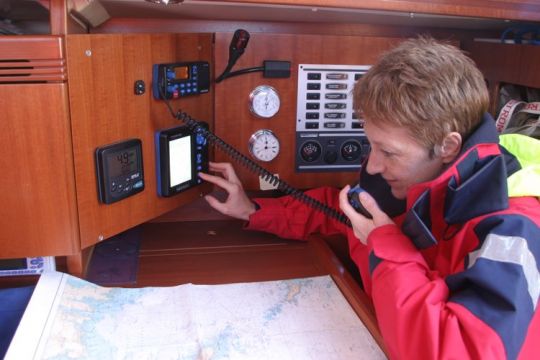
To conclude, even if it is an obvious repetition, the best way not to disappear entirely in case of a fall into the sea is to wear the life jacket and to hold on to the boat with its lanyard, permanently.
